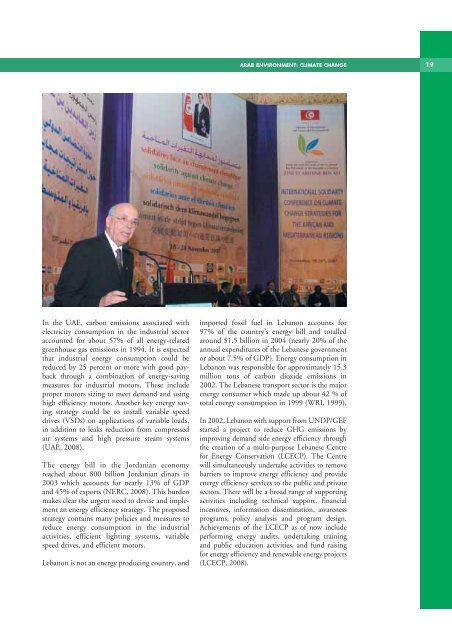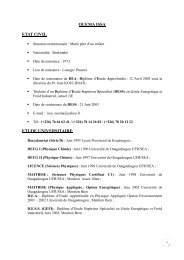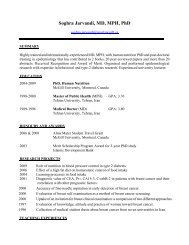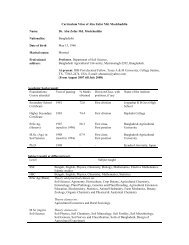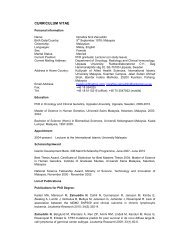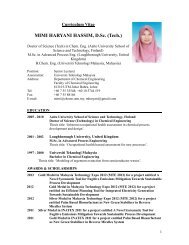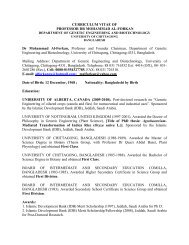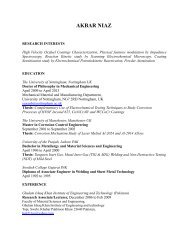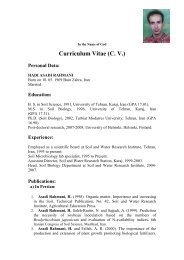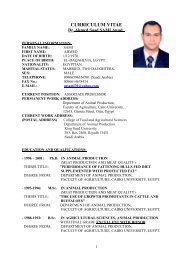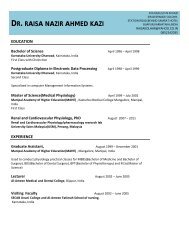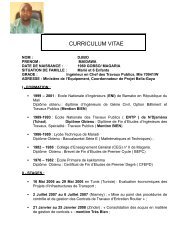Impact of Climate Change on Arab Countries - IPCC
Impact of Climate Change on Arab Countries - IPCC
Impact of Climate Change on Arab Countries - IPCC
You also want an ePaper? Increase the reach of your titles
YUMPU automatically turns print PDFs into web optimized ePapers that Google loves.
ARAB ENVIRONMENT: CLIMATE CHANGE 19<br />
In the UAE, carb<strong>on</strong> emissi<strong>on</strong>s associated with<br />
electricity c<strong>on</strong>sumpti<strong>on</strong> in the industrial sector<br />
accounted for about 57% <str<strong>on</strong>g>of</str<strong>on</strong>g> all energy-related<br />
greenhouse gas emissi<strong>on</strong>s in 1994. It is expected<br />
that industrial energy c<strong>on</strong>sumpti<strong>on</strong> could be<br />
reduced by 25 percent or more with good payback<br />
through a combinati<strong>on</strong> <str<strong>on</strong>g>of</str<strong>on</strong>g> energy-saving<br />
measures for industrial motors. These include<br />
proper motors sizing to meet demand and using<br />
high efficiency motors. Another key energy saving<br />
strategy could be to install variable speed<br />
drives (VSDs) <strong>on</strong> applicati<strong>on</strong>s <str<strong>on</strong>g>of</str<strong>on</strong>g> variable loads,<br />
in additi<strong>on</strong> to leaks reducti<strong>on</strong> from compressed<br />
air systems and high pressure steam systems<br />
(UAE, 2008).<br />
The energy bill in the Jordanian ec<strong>on</strong>omy<br />
reached about 800 billi<strong>on</strong> Jordanian dinars in<br />
2003 which accounts for nearly 13% <str<strong>on</strong>g>of</str<strong>on</strong>g> GDP<br />
and 45% <str<strong>on</strong>g>of</str<strong>on</strong>g> exports (NERC, 2008). This burden<br />
makes clear the urgent need to devise and implement<br />
an energy efficiency strategy. The proposed<br />
strategy c<strong>on</strong>tains many policies and measures to<br />
reduce energy c<strong>on</strong>sumpti<strong>on</strong> in the industrial<br />
activities, efficient lighting systems, variable<br />
speed drives, and efficient motors.<br />
Leban<strong>on</strong> is not an energy producing country, and<br />
imported fossil fuel in Leban<strong>on</strong> accounts for<br />
97% <str<strong>on</strong>g>of</str<strong>on</strong>g> the country’s energy bill and totalled<br />
around $1.5 billi<strong>on</strong> in 2004 (nearly 20% <str<strong>on</strong>g>of</str<strong>on</strong>g> the<br />
annual expenditures <str<strong>on</strong>g>of</str<strong>on</strong>g> the Lebanese government<br />
or about 7.5% <str<strong>on</strong>g>of</str<strong>on</strong>g> GDP). Energy c<strong>on</strong>sumpti<strong>on</strong> in<br />
Leban<strong>on</strong> was resp<strong>on</strong>sible for approximately 15.3<br />
milli<strong>on</strong> t<strong>on</strong>s <str<strong>on</strong>g>of</str<strong>on</strong>g> carb<strong>on</strong> dioxide emissi<strong>on</strong>s in<br />
2002. The Lebanese transport sector is the major<br />
energy c<strong>on</strong>sumer which made up about 42 % <str<strong>on</strong>g>of</str<strong>on</strong>g><br />
total energy c<strong>on</strong>sumpti<strong>on</strong> in 1999 (WRI, 1999).<br />
In 2002, Leban<strong>on</strong> with support from UNDP/GEF<br />
started a project to reduce GHG emissi<strong>on</strong>s by<br />
improving demand side energy efficiency through<br />
the creati<strong>on</strong> <str<strong>on</strong>g>of</str<strong>on</strong>g> a multi-purpose Lebanese Centre<br />
for Energy C<strong>on</strong>servati<strong>on</strong> (LCECP). The Centre<br />
will simultaneously undertake activities to remove<br />
barriers to improve energy efficiency and provide<br />
energy efficiency services to the public and private<br />
sectors. There will be a broad range <str<strong>on</strong>g>of</str<strong>on</strong>g> supporting<br />
activities including technical support, financial<br />
incentives, informati<strong>on</strong> disseminati<strong>on</strong>, awareness<br />
programs, policy analysis and program design.<br />
Achievements <str<strong>on</strong>g>of</str<strong>on</strong>g> the LCECP as <str<strong>on</strong>g>of</str<strong>on</strong>g> now include<br />
performing energy audits, undertaking training<br />
and public educati<strong>on</strong> activities, and fund raising<br />
for energy efficiency and renewable energy projects<br />
(LCECP, 2008).


